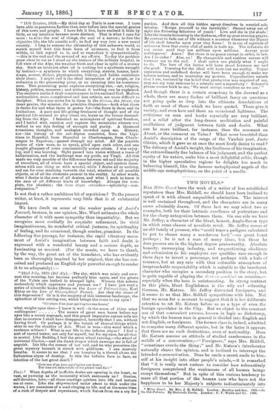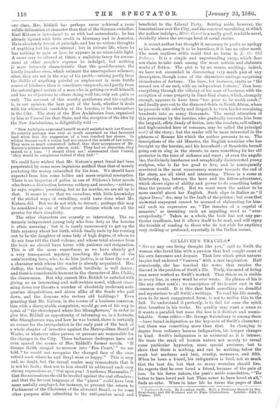TWO NOVELS.*
HAD .3Iitre Court been the work of a writer of less established reputation than Mrs. Riddell, we should have been inclined to speak of it with almost unqualified admiration. The interest is well sustained throughout, and the characters are in many cases admirably drawn. Of these last we may select two as examples, both for their intrinsic excellence of portraiture and for the sharp antagonism between them. On one side we have Mr. Jeffley, a character of the blunt, honest, Anglo-Saxon type in which some classes of novelists revel. Mr. Jefiley comes of an old family of yeomen, who "could trace a pedigree calculated to put to shame many a mushroom lord,"—no great boast perhaps ; he is not a man of many ideas, but those he does possess are in the highest degree praiseworthy. Absolute honesty, unwearying industry, and unquestioning obedience and submission to his employers are qualities rare enough in these days to invest a personage, not perhaps with a halo of romance, but at any rate with that estimable atmosphere of irreproachable respectability which is suitable to the beneficent character who occupies a secondary position in the story, but is quite capable of playing the dons cu luctehin4 on occasion,— especially when the hero is uninteresting. In strong contrast to this plain, blunt Englishman is the wily and scheming German, Mr. Katzen. Mr. Jeffley distrusted foreigners, and it seems to us that Mrs. Riddell sympathises with him. Not that we mean for a moment to suggest that it is her deliberate intention to set Mr. Katzen before us as a type of even the foreign speculator in the City. But we object to the constant use of that convenient process, known in logic as dichotomy, by which the human race in general is divided into English and not-English, or foreigners. The former class is, indeed, admitted to comprise many different species, but in the latter it appears that there are no such distinctions, even of nationality. Does Mr. Katzen assume an attitude of studied carelessness in the middle of a conversation,—" Foreigners," says Mrs. Riddell, " sometimes overdo the thing ;" and Mr. Katzen's interlocutor naturally shares the opinion, and is inclined to interrupt the intended communication. Does he smile a secret smile to him- self at his insight into other people's minds,—it is remarked that "it is really most curious to consider how exhaustively foreigners comprehend the weaknesses of all human beings except themselves." But in spite of this chrions tendency to mass all that portion of the human race who have not the happiness to be her Majesty's subjects indiscriminately into • Mitre Court. By Mrs. J. H. Riddell. London : Bentley and Son. 1885.—In the Old Poluzo, By Gertrude Forde. London : F. V. Waite and Co. 1885.
one class, Mrs. Riddell has perhaps never achieved a more subtle delineation of character than that of the German swindler.
Karl Katzen is introduced to us with bad antecedents ; he has already figured with little credit in Germany and in America. He is absolutely devoid of principle, and has no serious thoughts of anything but his own interest ; but in private life, where he has nothing to gain or lose, he appears in no unarniable light. A sneer may be allowed at times, a malicious fancy for amuse- ment at other people's expense be indulged, but nothing is more intensely characteristic than the good-humour, the kindly impulses even, which animate the unscrupulous schemer, when they are not in the way of his profit,—arising partly from the dislike of anything painful or unpleasant (a more fertile source of kindness than is sometimes supposed), and partly from the natural good-nature of a man who is getting on well himself, and has no objections to others doing well too, only not quite so well. The account of this worthy gentleman and his exploits is, in our opinion, the best part of the book, whether it deals with his whimsical courtship of the heroine, or his enterprises in the City. The story of the New Andalusian loan, organised by him as Consul for that State, and the reception of the idea by the New Andalusians, is delightfully told
New Andalusia expressed herself as well satisfied with her Consul. No country perhaps was ever so much surprised as that favoured land when first the suggestion of a loan reached her shores. In wildest dreams such a notion had not entered the minds of her rulers. They were so much astonished indeed, that their acceptance of Mr. Katzen's scheme seemed almost cold. They had no objection, they stated, to a loan. I should think not,' commented their Consul, they would be simpletons indeed if they had.' "
We could have wished that Mr. Katzen's great fraud had been perpetrated by some more ingenious method than that of merely pocketing the money subscribed for his loan. We should have expected from him some bolder and more original conception. There is an inspector of police in one of Dickens's later novels who draws a distinction between robbery and murder,—robbery, he says, requires 'prenticing, but as for murder, we are all up to that. It seems to us that we ourselves, with little knowledge of the wicked ways of swindling, could have done what Mr. Katzen did. But we do not wish to detract ; perhaps this may be considered as one of those great designs which are all the greater for their simplicity.
The other characters are scarcely so interesting. The ex- tremely independent young lady who does duty as the heroine is often amusing ; but it is surely unnecessary to get up the little mystery about her birth, which finally ends by her turning out to be the daughter of some lady of high degree, of whom we do not hear till the third volume, and whose total absence from the book we should have borne with patience and resignation. This is all the more superfluous as we have already got a very transparent mystery touching the identity of the uninteresting hero, who, to do him justice, is at least the son of a character with whom the reader is already acquainted. Mrs. Jeffiey, the bustling, active, selfish landlady, is well drawn; and there is considerable humour in the character of Mrs. Childs, the charwoman. But why cannot Mrs. Riddell be satisfied with giving us an interesting and well-written novel, without cram- ming down our throats a number of absolutely irrelevant anti- quarian disquisitions, and abuse alike of the Sends who pull down, and the demons who restore old buildings ? Even granting that Mr. Katzen, in the course of a business conversa- tion with a disreputable compatriot, would go out of his way to speak of "the churchyard where lies Shaughsware," in order to give Mrs. Riddell an opportunity of informing ns, in a footnote, who Shaughsware was, and how he was buried, there is certainly no excuse for the interpolation in the early part of the book of a whole chapter of invective against the Metropolitan Board of Works, or whatever other person or persons are responsible for the changes in the City. These barbarous destroyers have not even spared the scenes of Mrs. Riddell's former novels. "If George Geith strayed to-morrow into Fen Court,' " we are told, " he would not recognise the changed face of the once retired nook where he and Beryl were so happy." This is very
sad, no doubt, but the casual reader may remonstrate that it is not his fault ; that not to him should be addressed such very strong expressions as, " Out upon you! Anathema Maranatha !"
that the accusations should be levelled against the real offenders ; and that the fervent language of the " plaint " could have been more usefully employed, for instance, to prevent the return to Parliament of the Chairman of the aforesaid Board, or for some other purpose alike refreshing to the antiquarian mind and
beneficial to the Liberal Party. Setting aside, however, the lamentations over the City, and the constant moralising in which the author indulges, Mitre Court is a really good, readable novel, decidedly above the average level of serial stories.
A recent author has thought it necessary to prefix an apology to his work, asserting it to be harmless, if it has no other merit. The most captious critic could find no harm in In the Old Palazzo. It is a simple and unpretending story, which does not claim to take rank among the more artistic and elaborate works of fiction. The plot is by no means exciting ; indeed, we have not succeeded in discovering very much plot of any description, though some of the characters undergo surprising vicissitudes of fortune. The hero, for instance, starts as "the second son of an earl, with an independent fortune ;" then loses everything through the villainy of his man of business, with the exception of some property in East-End slums, which, strangely enough, appears to have been " too poor to be worth much ;" and finally goes out to the diamond-fields in South Africa, where he proceeds with celerity and despatch to turn his few remaining hundreds into as many thousands. The moral education of this personage by the heroine, who gradually converts him from the languid, effete dandy of fiction, into the resolute, self-reliant, and high-minded hero of romance, may be called the principal motif of the story ; but the reader will be more interested in the pictures of Roman life which the author presents to us. The descriptions of the old Maestro, the English musician who has brought up the heroine, and his household ; of Benedetta herself going out to sing in the streets, to earn something for her old protector in the time of sickness and want ; of even the angelic Inn, the divinely handsome and seraphically disinterested young sculptor, who is _far too good to live, and is consequently murdered in the most unnecessary manner towards the end of the story, are all vivid and interesting. There is a scene at Kimberley, too, between the hero and his fellow-adventurer, which shows signs of ability and power to do something better than the present effort. But we must warn the author to be more careful about her English. Such slips in Italian as "il signor Duco," &c., may be the fault of the printer ; but even that universal scapegoat cannot be accused of elaborating for him- self such an expression as, " The inmates of a cagefnl of canaries," or inventing such an appalling word as "over- scrupulosity." Taken as a whole, the book has not any par- ticular excellence, but it allows itself to be read, and will repay the trouble of reading to those who do not wish for anything very striking or profound, especially in the Italian scenes.



































 Previous page
Previous page